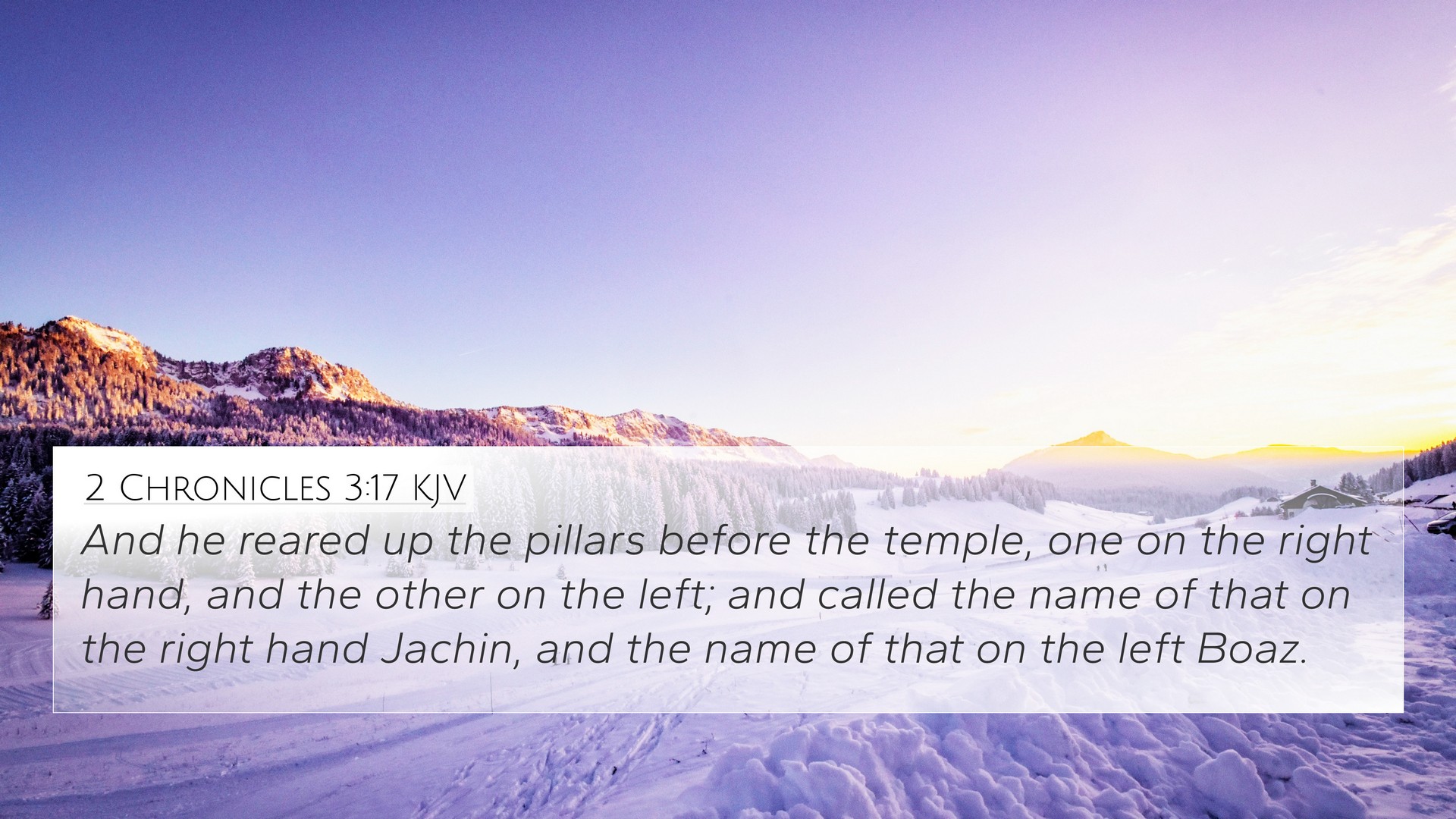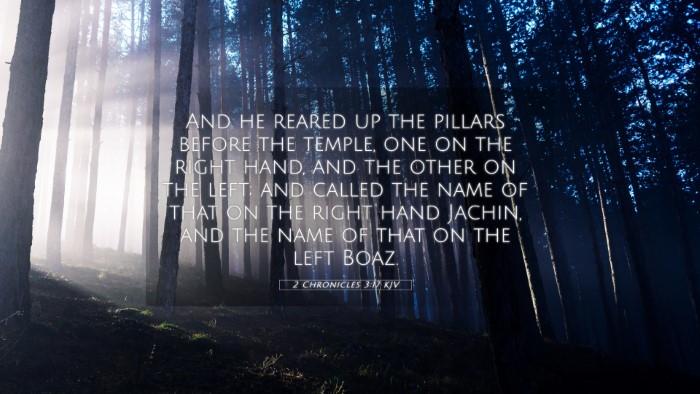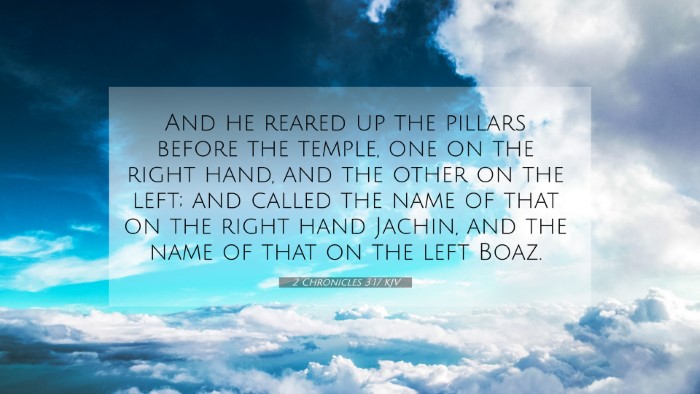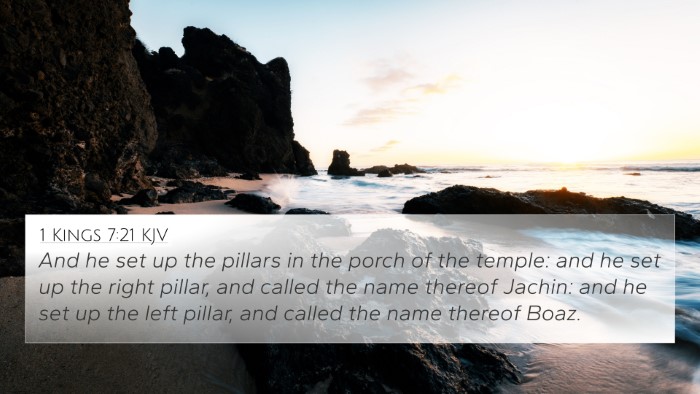Understanding 2 Chronicles 3:17
Bible Verse: 2 Chronicles 3:17 - "And he reared up the pillars before the temple, one on the right hand, and the other on the left: and called the name of that on the right hand Jachin, and the name of that on the left Boaz."
Introduction
This verse, placed within the context of King Solomon’s construction of the Temple in Jerusalem, highlights the significance of the two pillars: Jachin and Boaz. The verse not only describes the architectural features of the Temple but also symbolically represents underlying themes of strength and stability in God's presence.
The Meaning of Jachin and Boaz
Interpretation: The names of the pillars themselves are significant:
- Jachin: Translated as "He will establish," this pillar symbolizes stability and God's promise to strengthen His people.
- Boaz: Meaning "In Him is strength," this has been interpreted as a reminder of God’s omnipotence and the strength available to the faithful.
Insights from Commentaries
Matthew Henry: In his commentary, Henry emphasizes that the pillars served as a physical representation of God’s attributes—strength and establishment. They were not merely decorative but delivered a spiritual message to the people regarding their reliance on God.
Albert Barnes: Barnes points out the architectural significance, suggesting that the pillars also indicated the grandeur of the Temple. They stood as a testament to the nation’s relationship with God and were a focal point for worship.
Adam Clarke: Clarke elaborates on the historical significance and the symbolic representation of the pillars, asserting that they encapsulate the idea of stability in God’s promises and His presence among His people, thus forming a link between the physical temple and spiritual well-being.
Bible Verse Cross-References
To further understand this verse, several related scriptures reveal the thematic implications of Jachin and Boaz:
- 1 Kings 7:21: This parallel account in Kings reinforces the imagery and denotes the same pillars.
- Isaiah 28:16: "Therefore thus saith the Lord GOD, Behold, I lay in Zion for a foundation a stone, a tried stone, a precious cornerstone, a sure foundation." This speaks to the stability that God provides.
- Exodus 26:32: Discusses the curtains and fabric of the Tabernacle, relating to the Temple's structure.
- Psalm 127:1: "Except the LORD build the house, they labour in vain that build it." This underlines the importance of divine involvement in building and stability.
- Jeremiah 17:7: "Blessed is the man that trusteth in the LORD, and whose hope the LORD is." This verse connects the joy and security of those who rely on God.
- Psalm 40:2: "He brought me up also out of a horrible pit, out of the miry clay, and set my feet upon a rock, and established my goings." Another affirmation of God’s establishing work in believers' lives.
- Hebrews 6:19: "Which hope we have as an anchor of the soul, both sure and steadfast." This reflects the theological understanding of God’s unchanging nature as it relates to the pillars of the temple.
Bible Verses that Relate to Each Other
These cross-references exemplify the theme of divine strength and establishment:
- Psalm 18:2: "The LORD is my rock, and my fortress, and my deliverer." Highlights the attributes that the pillars symbolize.
- Proverbs 18:10: "The name of the LORD is a strong tower: the righteous runneth into it, and is safe." This illustrates God's protective nature.
- 2 Corinthians 1:21-22: "Now he which stablisheth us with you in Christ, and hath anointed us, is God." This New Testament connection relates God's establishment through Christ.
Thematic Bible Verse Connections
The pillars also connect with various themes throughout Scripture:
- Strength in God: Jachin and Boaz stand as reminders that true strength comes from God, echoed in verses like Philippians 4:13, "I can do all things through Christ which strengtheneth me."
- Hope and Promise: The assurance that God establishes His purpose can be compared with Romans 15:13, "Now the God of hope fill you with all joy and peace in believing."
- The Faithfulness of God: Reflecting on themes of faithfulness seen in Lamentations 3:22-23, "It is of the LORD's mercies that we are not consumed..."
Conclusion
2 Chronicles 3:17, while specific in its architectural detail, opens doors to profound theological understandings about God's presence, strength, and establishment among His people. By cross-referencing this verse with others, believers can gain a deeper insight into the nature of God's promises and the stability that faith in Him provides.
Tools for Bible Cross-Referencing
To effectively study Bible verse connections, consider using:
- Bible Concordance: A tool for locating specific verses and their thematic connections.
- Bible Cross-Reference Guide: Useful for finding verses that relate thematically to one another.
- Comprehensive Bible Cross-Reference Materials: Explains links between various scriptures.
- Cross-reference Bible study methods: Techniques for exploring Biblical texts in relation to one another.



